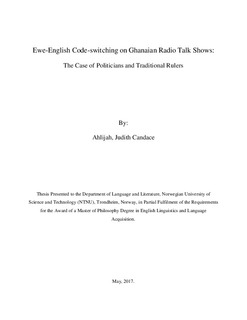| dc.description.abstract | One major outcome of language contact which is prevalent in Ghana is the phenomenon of code-switching (CS). This phenomenon permeates many domains of interaction in Ghana, including the domain of radio broadcasting. Though many radio stations in Ghana strive to promote knowledge of indigenous Ghanaian languages, they also provide fertile ground for code-switching between English and indigenous Ghanaian languages.
This thesis investigates the interaction between code-switching, identity and political discourse on Ghanaian radio talk shows, focusing on the code-switching behaviour of two categories of speakers, traditional rulers and politicians. The data for this study was collected from three radio stations located in the Volta region of Ghana and comprises audio recordings of interviews with four politicians and one traditional ruler. The thesis adopts, among others, the theoretical approaches of Myers-Scotton (1993b) and Gumperz (1982) to identify the discourse and social factors that influence the code-switching behaviour of the two groups of participants. The study also investigates what distinct patterns may emerge as a result of the socio-political statuses of the participants.
The analysis of the participants’ switching behaviour indicates that code-switching performs discourse-related functions such as quotations, the statement of figures, clarification, emphasis, and is also employed as a principle of economy. The analysis also shows that socially-motivated CS may be employed to draw on prestige, to save face, to assume a position of authority, and to indicate emotions such as anger. The study also shows that traditional rulers may be more inclined to lean more towards Ewe while politicians may be more inclined to switch to English due to the particular discourses that are usually associated with their socio-political statuses. | nb_NO |
